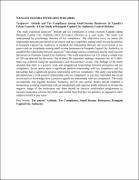| dc.contributor.author | Nangayi, Masaba Peter | |
| dc.date.accessioned | 2018-11-16T09:01:49Z | |
| dc.date.available | 2018-11-16T09:01:49Z | |
| dc.date.issued | 2013 | |
| dc.identifier.citation | Nangayi, M. P. (2013). Taxpayers’ Attitude and Tax Compliance among Small Income Businesses In Uganda’s Urban Councils: A Case Study of Kampala Capital City Authority-Central Division. Uganda Martyrs University, Nkozi: Uganda Martyrs University. | en_US |
| dc.identifier.uri | http://hdl.handle.net/20.500.12280/1023 | |
| dc.description.abstract | NANGAYI MASABA PETER (2013-M102-20042)
Taxpayers’ Attitude and Tax Compliance among Small Income Businesses In Uganda’s Urban Councils: A Case Study of Kampala Capital City Authority-Central Division.
The study examined taxpayers‟ attitude and tax compliance in urban councils, Uganda taking Kampala Capital City Authority (KCCA)-Central Division as a case study. The study was underpinned by psychology theories of tax compliance. The objectives were; to assess the relationship between perception of tax payers and tax compliance among small income businesses in Kampala Capital City Authority, to establish the relationship between the social norms of tax payers and tax compliance among small income businesses in Kampala Capital City Authority, to establish the relationship between taxpayers‟ knowledge and tax compliance among small income businesses in Kampala Capital City Authority. The study population was 122 where a sample size of 120 was selected for the study. Out of these, 86 responded making a response rate of 71.66%. Data was collected using the questionnaire, and documentary review. The findings of the study revealed that there is a positive weak and insignificant relationship between perception and tax compliance. Social norms have a significant positive relationship with tax compliance and tax knowledge had a significant positive relationship with tax compliance. The study concluded that perception has a weak positive relationship with tax compliance, it was also concluded that social norms and tax knowledge have a positive significant relationship with tax compliance. The study recommends that Uganda Revenue Authority, KCCA and partner bodies should establish a harmonious working relationship with all stakeholders and vigorous public relations to reverse the negative image of the institutions and there should be massive sensitisation programmes to increase awareness, educate the public and remind them that they are partners, as opposed to mere subjects forced to pay taxes.
Key Words: Tax payers’ Attitude, Tax Compliance, Small Income Businesses, Kampala Capital City Authority. | en_US |
| dc.language.iso | en | en_US |
| dc.publisher | Uganda Martyrs University | en_US |
| dc.subject | Tax payers’ Attitude | en_US |
| dc.subject | Tax Compliance | en_US |
| dc.subject | Small Income Businesses | en_US |
| dc.subject | Kampala Capital City Authority | en_US |
| dc.title | Taxpayers’ Attitude and Tax Compliance among Small Income Businesses In Uganda’s Urban Councils: A Case Study of Kampala Capital City Authority-Central Division. | en_US |
| dc.type | Thesis | en_US |


